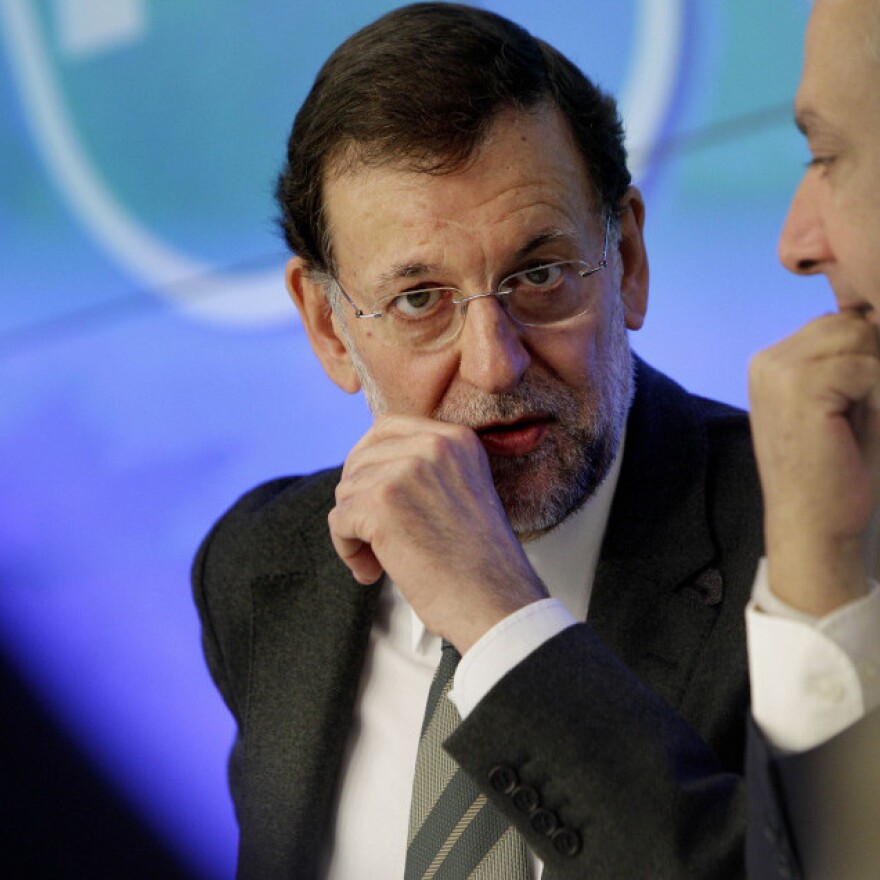Spain's Prime Minister Mariano Rajoy visited Poland last week and tried to assure international markets that Spain would not join the list of European nations needing a bailout.
"Spain will not be rescued," he said at a news conference. "It's not possible to rescue Spain. There's no intention of it, and we don't need it."
However, Spain's borrowing costs are nearing levels that were followed by bailouts for Greece, Ireland and Portugal.

Spain did get a bit of good news Tuesday as investors showed strong interest in short-term Spanish bonds, which helped global financial markets rally.
Spain's latest troubles are coming after Rajoy slashed $35 billion from his budget in a single year, says Gayle Allard, an economist at Madrid's IE Business School.
"This is the most restrictive budget in their history," Allard says. "This labor market reform is the most dramatic we have seen anywhere in any country in the postwar ... So what else do they want?"
No Imminent Sign Of Growth
What the markets may want is growth, but Spain's economy is forecast to shrink 1.7 percent this year. With 1 in 4 Spaniards out of work, the government is paying more in unemployment benefits and collecting less tax revenue, so it's having trouble paying its debts.
Markets also want to see signs that Spain can stop living on credit. Last month, Spanish banks borrowed record amounts from the European Central Bank, just to stay afloat.
Another problem may be with Rajoy himself. He and his Cabinet are notoriously tight-lipped, at a time when Spain might benefit from a vocal, rallying leader, says economist Fernando Fernandez.
"They're extremely discreet. They never commit themselves to anything unless it's absolutely necessary," Fernandez says.
Rajoy was accused of playing politics by delaying some austerity measures until after provincial elections last month, in Andalusia. His conservatives still failed to win a majority there.
When he finally did announce his budget, many economists were in disbelief, says Allard.

"My feeling, when they announced the budget, was, 'Oh, they've left a few tricks up their sleeve,' " she says.
Public sector spending was cut, but there were no changes to free health care, education or sales tax. Allard says that might be to leave room for cuts next year. But the markets could react with fear that Rajoy is in denial about the severity of this crisis.
More Cuts Expected
This week, lawmakers are scrambling to overhaul health and education, to wring out another $13 billion. They've got pressure from the markets on one side, but the people on the other.
Hundreds of thousands of Spaniards went on strike against Rajoy's cuts last month. Among them was Caetana Varela, a neurologist whose research budget was cut in half. She now makes $700 a month, and had to move back in with her parents. For her, this is the last straw.
"Education and health are the most important things in a country," Varela says. "That's what built a society, education and health. For me, it's the last thing that money should be taken from."
Varela might not have a choice. José Manuel Calvo, at El País newspaper, says Spaniards have to get used to paying for services they took for granted in the boom years.
"We think, and we say, that education is free in this country, and we think that health care is free — no," Calvo says. "We don't pay at the door, but we pay through the taxes. We are now realizing that there is no free lunch."
The question now is whether markets will allow Spain even a few more weeks to try to get its house in order. Spain's finance minister met with investors in Paris on Monday, and had more meetings with European officials planned this week.
Copyright 2020 NPR. To see more, visit https://www.npr.org.



